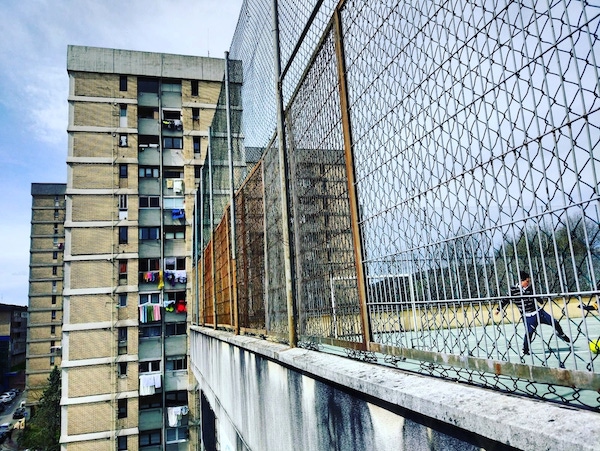The Shadows of Futures Gone By
Social Reconfigurations of Hope in Deindustrialized City of Errenteria, Basque Country
DOI:
https://doi.org/10.29340/en.v4n7.169Keywords:
hope, structural adjustment, uncertainty, prosperity, deindustrialization, temporalityAbstract
Errenteria has historically been one of the main industrial cities in the Basque Country, which helped it reach full employment levels and job stability in the sixties and seventies, particularly regarding male industrial jobs, up until the mid-seventies, when the transition governments began restructuring industries, allegedly to prepare for the entry into the European Economic Community and for the challenge of a free market. The loss of thousands of jobs was followed by a deregularization of the labor market, which led to a great decrease in the standards of living, which was intensified by the financial crisis of 2008 and austerity policies. This article aims to show how, for the younger generations of this city, past futures keep casting shadows on the ways of viewing a future marked by an increasing uncertainty. In this sense, I discuss the common sense of “going backwards”, pointing out that going backwards seems to allude, not only to the crumbling of the achievements of past generations, but also to a confusing reconfiguration of what they can now expect of the future.
Downloads
References
Alonso, Luis E. (2007). La crisis de la ciudadanía laboral. Barcelona: Anthropos.
Barcenilla, Miguel Á. (1999). La pequeña Manchester. Origen y consolidación de un núcleo industrial gipuzcoano. Errenteria (1845-1905). San Sebastián: Diputación Foral de Gipúzcoa.
Barcenilla, Miguel Á. (2004). “El pasado de Oarsoaldesa. Vivir entre fabricas”. En 100 años de desarrollismo en Errenteria y su comarca. Errenteria: Agencia de Desarrollo Comarcal Oarsoaldea y Ayuntamiento de Errenteria, pp. 11-42.
Bauman, Zygmunt (1998). Globalisation: The Human Consequences. Cambridge: Polity Press.
Beck, Ulrich (1992). Risk Society: Towards a New Modernity. Londres: Sage.
Benito, Ana M. (2007). “El Patrimonio Industrial de Rentería”. Oarso, núm. 42, pp. 45-49.
Cottereau, Alain y Mokhtar M. Marzok (2012). Une famille andalouse. Ethnocomptibilité d´une économie invisible. París: Bouchene.
Escobar, Arturo (2010). “Latin America at a Crossroads: Alternative Modernizations, Postliberalism, or Post Development?”. Cultural Studies, vol. 24, núm. 1, pp. 1-65. https://doi.org/10.1080/09502380903424208 DOI: https://doi.org/10.1080/09502380903424208
Etxezarreta, Miren (1991). La reestructuración del capitalismo en España. Madrid: Fuhem e Icaria.
Eustat, Instituto Vasco de Estadística (2016). Censos de población y viviendas. Población de 16 y más años ocupada de la C.A. de Euskadi por municipio, situación profesional y periodo. [Base de datos]. Recuperado de: https://www.eustat.eus/bankupx/pxweb/es/spanish/-/PX_2314_po11.px/table/tableViewLayout1/?rxid=6a2ae2d5-979a-4f58-bdbc-e35c680b99d1, consultado el 19 de febrero de 2021.
— (2016b). Tasa de paro de la población de 16 y más años de la C.A. de Euskadi por ámbitos territoriales, sexo y periodo. [Base de datos]. Recuperado de: https://es.eustat.eus/bankupx/pxweb/es/spanish/-/PX_2315_pp04a.px/table/tableViewLayout1/?rxid=2d04795f-3f67-4428-8596-9d43330341b1, consultado el 19 de febrero de 2021.
Ezquerra, Sandra (2012). “Acumulación por desposesión, género y crisis en el Estado Español”. Economía Crítica, vol. 14, núm. 2, pp. 124-147. Recuperado de http://www.revistaeconomiacritica.org/sites/default/files/revistas/n14/Semimonografico-2.-Ezquerra.pdf, consultado el 4 de febrero de 2021.
Hänsch, Valerie, Lena Kroeker y Silke Oldenburg (2017). “Uncertain Future(s). Perceptions on Time between the Immediate and the Imagined”. Tsantsa, vol. 22, pp. 4-17. https://doi.org/10.36950/tsantsa.2017.22.7342 DOI: https://doi.org/10.36950/tsantsa.2017.22.7342
Harvey, David (2007). Breve historia del neoliberalismo. Madrid: Akal.
Garcés, Marina (2017). Nova il.lustració radical. Barcelona: Anagrama.
Gobierno Vasco (1987). La pobreza en la Comunidad Autónoma Vasca. Vitoria-Gasteiz: Gobierno Vasco.
Goddard, Victoria (2019). “Trabajo y la buena vida o vida digna. Reflexiones y críticas desde un análisis feminista”. Quaderns, núm 35, pp. 5-22.
Kleist, Nauja y Stef Jansen (2016). “Introduction: Hope over Time – Crisis, Immobility and Future-Making”. History and Anthropology, núm. 27, vol. 4, pp. 373-392. https://doi.org/10.1080/02757206.2016.1207636 DOI: https://doi.org/10.1080/02757206.2016.1207636
Knight, Daniel M. (2016). “Temporal Vertigo and Time Vortices on Greece’s Central Plain”. The Cambridge Journal of Anthropology, núm 34, vol 1, pp. 32-44. https://doi.org/10.3167/ca.2016.340105 DOI: https://doi.org/10.3167/ca.2016.340105
Lacunza, Juan M. (2012). “La empresa Victorio Luzuriaga en Rentería”. Oarso, núm 47, pp. 27-30.
L’Estoile, Benoît de (2014). “Money Is Good, but a Friend Is Better. Uncertainty, Orientation to the Future, and the Economy”. Current Anthropology, vol. 55, núm. 9, pp. 62-73. https://doi.org/10.1086/676068 DOI: https://doi.org/10.1086/676068
Lewis, Jane (2002). “Gender and Welfare State Change”. European Societies, vol. 4, núm. 4, pp. 331-357. https://doi.org/10.1080/1461669022000022324 DOI: https://doi.org/10.1080/1461669022000022324
López Calle, Pablo (2018). “Subjetividad precaria como recurso productivo: crisis, trabajo e identidad en las periferias metropolitanas desindustrializadas”. Revista Española de Sociología, núm. 27, pp. 1-18 DOI: https://doi.org/10.22325/fes/res.2018.56
Mendialdea, Bibiana y Nacho Álvarez (2005). “Ajuste neoliberal y pobreza salarial: los working poor en la Unión Europea”. Viento Sur, núm. 82, pp. 55-64
Motakef, Monta (2019). “Recognition and Precarity of Life Arrangement: towards an Enlarged Understanding of Precarious Working and Living Conditions”. Distinktion: Journal of Socia Theory, vol. 2, núm. 20, pp. 156-172. https://doi.org/10.1080/1600910X.2019.1610019 DOI: https://doi.org/10.1080/1600910X.2019.1610019
Narotzky, Susana y Niko Besnier (2014). “Crisis, Value, and Hope: Rethinking the Economy: An Introduction to Supplement 9”. Current Anthropology, vol. 55, núm. 9, pp. 4–16. https://doi.org/10.1086/676327 DOI: https://doi.org/10.1086/676327
— (2016). “Spain is the Problem, Europe the Solution: Economic Models, Labour Organization and the Hope for a Better Future”, en John Gledhill (ed.), World Anthropologies in Practice. Londres: Bloomsbury, pp. 19-39. https://doi.org/10.4324/9781003087441-3 DOI: https://doi.org/10.4324/9781003087441-3
Olaizola Eizagire, Iñaki y Juan P. Olaberria Egiguren (2015). “Luzuriaga, un astillero gipuzcoano (1960-2000)”. Itsas Memoria. Revista de Estudios Marítimos del País Vasco, núm 8, pp. 91-151.
Palomera, Jaime (2015). The Political Economy of Spain. The Brief Story (1939-2014). Documento de trabajo del erc Greco Project. Recuperado de https://www.academia.edu/22098898/_2015_The_Political_Economy_of_Spain_A_brief_history_1939_2014, consultado el 4 de febrero de 2021.
Petras, James (1995). El Informe Petras. Padres-Hijos. Dos generaciones de trabajadores españoles. Barcelona: cgt.
Pérez Orozco, Amaia (2014). Subversión feminista de la economía. Aportes sobre un debate sobre el conflicto capital-vida. Madrid: Traficantes de sueños.
Picavea, Pedro (1988). “Rentería (1975-1986). Las transformaciones demográficas de un municipio industrial”. Bilduma. Revista del Servicio de Archivo del Ayuntamiento de Errenteria, núm. 2, pp. 9-24.
Ruzafa, Rafael (2017). “Caras tristes de un proceso histórico. La desindustrialización de la ría de Bilbao en el último cuarto del siglo xx”. Historia, Trabajo y Sociedad, núm. 8, pp. 11-33.
Santamaría, Elsa (2009). Trayectorias laborales en los márgenes del empleo: experiencias de precariedad en los procesos de construcción identitaria. Bilbao: Euskal Herriko Unibertsitatea.
Torres Enjuto, María Concepción (1991). “Diez años de reconversión industrial en Euskadi, 1980-1990)”. Boletín de la Asociación de Geógrafos Españoles, núm. 13, pp.165-186
Valdaliso, Jesús M. (2003). “Crisis y reconversión de la industria de construcción naval en el País Vasco”. Ekonomiaz, núm. 54, pp. 53-67.
Villarreal, Magdalena (2008). “Deudas, drogas, fiado y prestado en las tiendas de abarrotes rurales”. Ruris, núm. 1, vol. 2, pp. 99-128. DOI: https://doi.org/10.53000/rr.v2i1.664
— Lya Niño y Joshua Greene (2017). “Malabarismos financieros en contextos transfronterizos”, en Magdalena Barros y Agustín Escobar (coord.), Migración internacional, interna y en tránsito: actores y procesos. Libro 1: Nuevos procesos en la migración internacional y mercados de trabajo. México: ciesas, pp. 81-98.
Williams, Raymond (1977). Marxism and Literature. Oxford: Oxford University Press.
Zeitlyn, David (2015). “Looking Forward, Looking Back”. History and Anthropology, vol. 26, núm. 4, pp. 381–407. https://doi.org/10.1080/02757206.2015.1076813 DOI: https://doi.org/10.1080/02757206.2015.1076813

Published
Issue
Section
License
Copyright (c) 2021 Encartes

This work is licensed under a Creative Commons Attribution-NonCommercial 4.0 International License.
Aviso de derechos de autor
- Los autores/as conservan los derechos de autor y ceden a la revista el derecho a la primera publicación con el trabajo registrado con la licencia de atribución Creative Commons, que permite a terceros utilizar lo publicado siempre que mencionen la autoría del trabajo y a la primera publicación en esta revista
- Los autores/as pueden realizar otros acuerdos contractuales independientes y adicionales para la distribución no exclusiva de la versión del artículo publicado en esta revista (por ej. Incluirlo en un repositorio institucional o publicarlo en un libro) siempre que indiquen claramente que el trabajo se publicó por primera vez en esta revista.
El material puede ser copiado, distribuido, comunicado, ejecutado públicamente. Se pueden hacer obras derivadas de él. No se puede utilizar para fines comerciales. Se debe reconocer y citar la obra de la forma en que tú especifiques.









